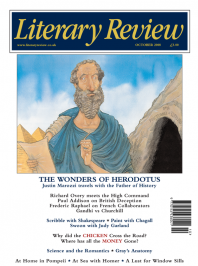Nigel West
Smoking Gun
The Sixth Man
By James McNeish
Quartet Books 414pp £25
The original five of the notorious Cambridge spies, Guy Burgess, Donald Maclean, Kim Philby, Anthony Blunt and John Cairncross, are now fairly familiar, but the name of the New Zealander Paddy Costello is probably not. He was a Russian-speaking, Trinity College, Cambridge-educated soldier, diplomat and academic on the political left whose son Mick became a leading figure in the ill-fated, Kremlin-backed Communist Party of Great Britain. However, in 1981, seventeen years after his death in Manchester, Paddy Costello was linked to espionage by an assertion in Chapman Pincher’s Their Trade is Treachery that MI5 had believed Costello to have been a fully-fledged Soviet mole. According to Pincher, who had received his information from his covert co-author, the renegade self-styled MI5 spycatcher Peter Wright, Costello had been spotted communicating with a Soviet intelligence officer while under surveillance, had acted as a letter-box for the wife of a Swedish spy and, most significantly, in May 1954 had issued authentic New Zealand passports to Morris and Lona Cohen, a pair of KGB illegals who were subsequently arrested in London and sentenced in March 1961 to long terms of imprisonment for breaches of Official Secrets Acts. At the time he had issued them, according to Wright (who failed to repeat his allegation in Spycatcher in 1987), Costello had been working at the tiny New Zealand legation in Paris, staffed by just three people, and had broken the rules to mail the two passports to the Cohens, who were then masquerading as Peter and Helen Kroger and claiming to be in poor health in an Austrian spa.
In The Sixth Man, which is a curious title considering the content, James McNeish, a New Zealand academic, seeks to debunk the charges against Costello. The author omits to mention the first two claims made about Costello and instead concentrates on the circumstances in which the Cohens received their passports,

Sign Up to our newsletter
Receive free articles, highlights from the archive, news, details of prizes, and much more.@Lit_Review
Follow Literary Review on Twitter
Twitter Feed
It wasn’t until 1825 that Pepys’s diary became available for the first time. How it was eventually decrypted and published is a story of subterfuge and duplicity.
Kate Loveman tells the tale.
Kate Loveman - Publishing Pepys
Kate Loveman: Publishing Pepys
literaryreview.co.uk
Arthur Christopher Benson was a pillar of the Edwardian establishment. He was supremely well connected. As his newly published diaries reveal, he was also riotously indiscreet.
Piers Brendon compares Benson’s journals to others from the 20th century.
Piers Brendon - Land of Dopes & Tories
Piers Brendon: Land of Dopes & Tories - The Benson Diaries: Selections from the Diary of Arthur Christopher Benson by Eamon Duffy & Ronald Hyam (edd)
literaryreview.co.uk
Of the siblings Gwen and Augustus John, it is Augustus who has commanded most attention from collectors and connoisseurs.
Was he really the finer artist, asks Tanya Harrod, or is it time Gwen emerged from her brother’s shadow?
Tanya Harrod - Cut from the Same Canvas
Tanya Harrod: Cut from the Same Canvas - Artists, Siblings, Visionaries: The Lives and Loves of Gwen and Augustus John by Judith Mackrell
literaryreview.co.uk